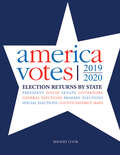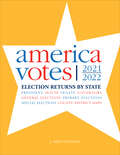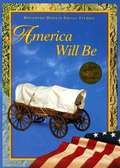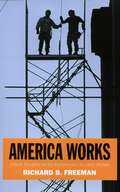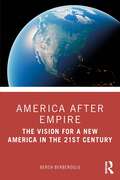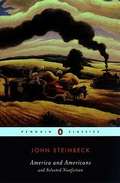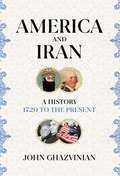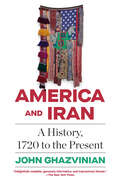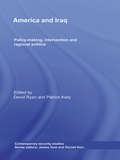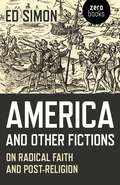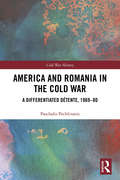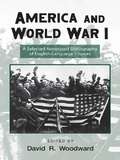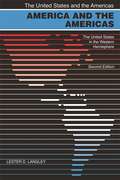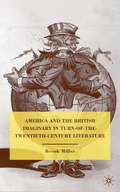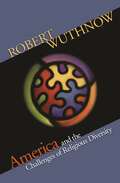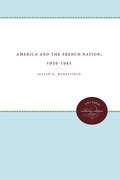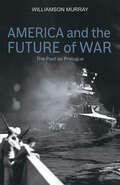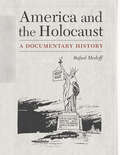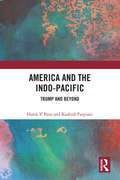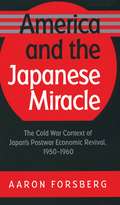- Table View
- List View
America Votes 34: 2019-2020, Election Returns by State
by Rhodes CookFirst published during the Eisenhower administration, researchers have long depended on America Votes for its consistent and detailed presentation of election data from across disparate state election offices. America Votes (AV) is published biennially, and since the mid-1990s has been authored or co-authored by Rhodes Cook, who brings to the volume years of election analysis experience and expertise in navigating the complicated U.S. electoral landscape. The book contains an introduction and election coverage by Cook, which will be expanded this edition to capture new trends analysis, and is predominantly composed of election result tables. Organized by state, this edition of AV is a valuable resource that includes official, state-certified special, primary, and general election returns for the House, Senate, and gubernatorial elections of 2019 and 2020.
America Votes 34: 2019-2020, Election Returns by State
by Rhodes CookFirst published during the Eisenhower administration, researchers have long depended on America Votes for its consistent and detailed presentation of election data from across disparate state election offices. America Votes (AV) is published biennially, and since the mid-1990s has been authored or co-authored by Rhodes Cook, who brings to the volume years of election analysis experience and expertise in navigating the complicated U.S. electoral landscape. The book contains an introduction and election coverage by Cook, which will be expanded this edition to capture new trends analysis, and is predominantly composed of election result tables. Organized by state, this edition of AV is a valuable resource that includes official, state-certified special, primary, and general election returns for the House, Senate, and gubernatorial elections of 2019 and 2020.
America Votes 35: 2021-2022, Election Returns by State
by John Miles ColemanFirst published during the Eisenhower administration, researchers have long depended on America Votes for its consistent and detailed presentation of election data from across disparate state election offices. America Votes (AV) is published biennially, and contains an introduction and election coverage by the author, which captures new trends analysis, and is predominantly composed of election result tables. Organized by state, this edition of AV is a valuable resource that includes official, state-certified special, primary, and general election returns for the House, Senate, and gubernatorial elections of 2021 and 2022.
America Votes 35: 2021-2022, Election Returns by State
by John Miles ColemanFirst published during the Eisenhower administration, researchers have long depended on America Votes for its consistent and detailed presentation of election data from across disparate state election offices. America Votes (AV) is published biennially, and contains an introduction and election coverage by the author, which captures new trends analysis, and is predominantly composed of election result tables. Organized by state, this edition of AV is a valuable resource that includes official, state-certified special, primary, and general election returns for the House, Senate, and gubernatorial elections of 2021 and 2022.
America Will Be
by Gary B. Nash J. Jorge Klor de Alva Jacqueline M. Cordova Beverly J. ArmentoSocial studies textbook.
America Works: Thoughts on an Exceptional U.S. Labor Market
by Richard B. FreemanThe U.S. labor market is the most laissez faire of any developed nation, with a weak social safety net and little government regulation compared to Europe or Japan. Some economists point to this hands-off approach as the source of America’s low unemployment and high per-capita income. But the stagnant living standards and rising economic insecurity many Americans now face take some of the luster off the U.S. model. In America Works, noted economist Richard Freeman reveals how U.S. policies have created a labor market remarkable both for its dynamism and its disparities. America Works takes readers on a grand tour of America’s exceptional labor market, comparing the economic institutions and performance of the United States to the economies of Europe and other wealthy countries. The U.S. economy has an impressive track record when it comes to job creation and productivity growth, but it isn’t so good at reducing poverty or raising the wages of the average worker. Despite huge gains in productivity, most Americans are hardly better off than they were a generation ago. The median wage is actually lower now than in the early 1970s, and the poverty rate in 2005 was higher than in 1969. So why have the benefits of productivity growth been distributed so unevenly? One reason is that unions have been steadily declining in membership. In Europe, labor laws extend collective bargaining settlements to non-unionized firms. Because wage agreements in America only apply to firms where workers are unionized, American managers have discouraged unionization drives more aggressively. In addition, globalization and immigration have placed growing competitive pressure on American workers. And boards of directors appointed by CEOs have raised executive pay to astronomical levels. Freeman addresses these problems with a variety of proposals designed to maintain the vigor of the U.S. economy while spreading more of its benefits to working Americans. To maintain America’s global competitive edge, Freeman calls for increased R&D spending and financial incentives for students pursuing graduate studies in science and engineering. To improve corporate governance, he advocates licensing individuals who serve on corporate boards. Freeman also makes the case for fostering worker associations outside of the confines of traditional unions and for establishing a federal agency to promote profit-sharing and employee ownership. Assessing the performance of the U.S. job market in light of other developed countries’ recent history highlights the strengths and weaknesses of the free market model. Written with authoritative knowledge and incisive wit, America Works provides a compelling plan for how we can make markets work better for all Americans. A Volume in the Russell Sage Foundation's Centennial Series
America Yesterday and Today
by Carol Berkin Joe Bertram Frantz Joan E. SchreiberSurveys the history of the United States from its first people through the European settlements and changes as a nation up to the present. Includes a unit on current conditions in neighboring countries in North, Central, and South America.
America after Empire: The Vision for a New America in the 21st Century
by Berch BerberogluAfter the end of America’s longest (20-year) war in Afghanistan and Iraq that cost more than $6 trillion and nearly half a million lives, what does the future hold for America and the American people in the 21st century? In this timely and important book, Berch Berberoglu provides an eye-opening account of the history of the American Empire from its inception to the present, with prospects for its future. Examining the worldwide expansion of the American Empire over the course of its turbulent history in great detail, Berberoglu assesses America’s imperial legacy in a sober way, highlighting its failure to come to terms with the enormous cost of this adventure in imperial overreach. But Berberoglu sees light at the end of the long, dark tunnel, when the American people will awaken and lead the way to a new America after empire in the coming decades of the 21st century.
America and Americans and Selected Nonfiction
by John Steinbeck Susan Shillinglaw Jackson J. BensonMore than four decades after his death, John Steinbeck remains one of the nation's most beloved authors. Yet few know of his career as a journalist who covered world events from the Great Depression to Vietnam. Now, this distinctive collection offers a portrait of the artist as citizen, deeply engaged in the world around him. In addition to the complete text of Steinbeck's last published book, America and Americans, this volume brings together for the first time more than fifty of Steinbeck's finest essays and journalistic pieces on Salinas, Sag Harbor, Arthur Miller, Woody Guthrie, the Vietnam War and more. This edition is edited by Steinbeck scholar Susan Shillinglaw and Steinbeck biographer Jackson J. Benson. .
America and Iran: A History, 1720 to the Present
by John GhazvinianIn recent times, the United States and Iran have seemed closer to war than peace, but that is not where their story began. When America was in its infancy, Thomas Jefferson and John Quincy Adams turned to the history of the Persian Empire as they looked for guidance on how to run their new country. And in the following century, Iranian newspapers heralded America as an ideal that their own government might someday emulate. How, then, did the two nations become the adversaries that they are today? In this rich, fascinating history, John Ghazvinian traces the complex story of America and Iran over three centuries. Drawing on years of research conducted in both countries – including access to Iranian government archives rarely available to Western scholars – he leads us through the four seasons of US-Iranian relations: from the spring of mutual fascination, where Iran, sick of duplicitous Britain and Russia interfering in its affairs, sought a relationship with the United States, to the long, dark winter of hatred that we are yet to see end. A revealing account, America and Iran lays bare when, where and how it all went wrong – and why it didn&’t have to be this way.
America and Iran: A History, 1720 to the Present
by John GhazvinianAn important, urgently needed book--a hugely ambitious, illuminating portrait of the two-centuries-long entwined histories of Iran and America, and the first book to examine, in all its aspects, the rich and fraught relations between these two powers--once allies, now adversaries. By an admired historian and the author of Untapped: The Scramble for Africa's Oil ("he would do Graham Greene proud"--Kirkus Reviews).In this rich, fascinating history, John Ghazvinian traces the complex story of the relations of these two powers back to the Persian Empire of the eighteenth century--the subject of great admiration of Thomas Jefferson and John Quincy Adams--and an America seen by Iranians as an ideal to emulate for their own government.Drawing on years of archival research both in the United States and Iran--including access to Iranian government archives rarely available to Western scholars--the Iranian-born, Oxford-educated historian leads us through the four seasons of U.S.-Iran relations: the "spring" of mutual fascination; the "summer" of early interactions; the "autumn" of close strategic ties; and the long, dark "winter" of mutual hatred.Ghazvinian, with grasp and a storyteller's ability, makes clear where, how, and when it all went wrong. And shows why two countries that once had such heartfelt admiration for each other became such committed enemies; showing us, as well, how it didn't have to turn out this way.
America and Iraq: Policy-making, Intervention and Regional Politics (Contemporary Security Studies)
by David Ryan Patrick KielyThis edited volume provides an overview on US involvement in Iraq from the 1958 Iraqi coup to the present-day, offering a deeper context to the current conflict. Using a range of innovative methods to interrogate US foreign policy, ideology and culture, the book provides a broad set of reflections on past, present and future implications of US-Iraqi relations, and especially the strategic implications for US policy-making. In doing so, it examines several key aspects of relationship such as: the 1958 Iraqi Revolution; the impact of the 1967 Arab-Israeli War; the impact of the Nixon Doctrine on the regional balance of power; US attempts at rapprochement during the 1980s; the 1990-91 Gulf War; and, finally, sanctions and inspections. Analysis of the contemporary Iraq crisis sets US plans against the ‘reality’ they faced in the country, and explores both attempts to bring security to Iraq, and the implications of failure.
America and Other Fictions: On Radical Faith and Post-Religion
by Ed SimonAt a moment of cultural and political crisis, with forces of reaction seemingly ascendant throughout the West, it's fair to ask what use does anyone have for America, God, or any other similar fictions? What use does theological language have for the radical facing the apocalypse? Among the subjects considered: the need for an Augustinian left, legacies of American violence, speaking in tongues, the humanities facing climate change, the maturity of realizing that you will die, how to sail towards Utopia, and witches.
America and Romania in the Cold War: A Differentiated Détente, 1969-80 (Cold War History)
by Paschalis PechlivanisThis book examines the US foreign policy of differentiation towards the socialist regimes of Eastern Europe as it was implemented by various administrations towards Ceausescu’s Romania from 1969 to 1980. Drawing from multi-archival research from both US and Romanian sources, this is the first comprehensive analysis of differentiation and shows that Washington’s Eastern European policy in the 1970s was more nuanced than the common East vs. West narrative suggests. By examining systemic Cold War factors such as the rise of détente between the two superpowers and the role of agency, the study deals with the dynamics that shaped the evolution of American-Romanian relations after Bucharest’s opening towards the West, and the subsequent embrace of this initiative by Washington as an instrument to undermine the unity of the Soviet bloc. Furthermore, it revises interpretations about Carter’s celebrated human rights policy based on the Romanian case, pointing towards a remarkable continuity between the three administrations under examination (Nixon, Ford and Carter). By doing so, this study contributes to the field by highlighting a largely neglected aspect of US foreign policy and uncovers the subtleties of Washington’s relations with one of the most vigorous actors of the Eastern European bloc. This book will be of much interest to students of Cold War Studies, US foreign policy, Eastern European politics and International Relations in general.
America and Vietnam: The Elephant and the Tiger
by Albert MarrinExamines the political history, military events, social impact, and long-term effects of the Vietnam War.
America and World War I: A Selected Annotated Bibliography of English-Language Sources (Routledge Research Guides to American Military Studies)
by David WoodwardAmerica and World War I, the first volume in the new Routledge Research Guides to American Military Studies series, provides a concise, annotated guide to the vast amount of resources available on the Great War. With over 2,000 entries selected from a wide variety of publications, manuscript collections, databases, and online resources, this volume will be an invaluable research tool for students, scholars, and military history buffs alike. The wide range of topics covered include war films and literature, to civil-military relations, to women and war. Routledge Research Guides to American Military Studies will include concise, easy-to-use bibliographic volumes on different American military campaigns throughout history, as well as tackling timely subjects such as women in the military and terrorism.
America and the Americas: The United States in the Western Hemisphere (2nd edition)
by Lester D. LangleyIn this completely revised and updated edition of America and the Americas, Lester D. Langley covers the long period from the colonial era into the twenty-first century, providing an interpretive introduction to the history of U. S. relations with Latin America, the Caribbean, and Canada. Langley draws on the other books in the series to provide a more richly detailed and informed account of the role and place of the United States in the hemisphere. In the process, he explains how the United States, in appropriating the values and symbolism identified with "America," has attained a special place in the minds and estimation of other hemispheric peoples. Discussing the formal structures and diplomatic postures underlying U. S. policy making, Langley examines the political, economic, and cultural currents that often have frustrated inter-American progress and accord.
America and the British Imaginary in Turn-of-the-Twentieth-Century Literature
by Brook MillerIn an innovative reading of fin-de-siecle cultural texts, Miller argues that British representations of America, Americans, and Anglo-American relations at the turn of the twentieth century provided an important forum for cultural distinction.
America and the Challenges of Religious Diversity
by Robert WuthnowMuslims, Hindus, Buddhists, and adherents of other non-Western religions have become a significant presence in the United States in recent years. Yet many Americans continue to regard the United States as a Christian society. How are we adapting to the new diversity? Do we casually announce that we "respect" the faiths of non-Christians without understanding much about those faiths? Are we willing to do the hard work required to achieve genuine religious pluralism? Award-winning author Robert Wuthnow tackles these and other difficult questions surrounding religious diversity and does so with his characteristic rigor and style. America and the Challenges of Religious Diversity looks not only at how we have adapted to diversity in the past, but at the ways rank-and-file Americans, clergy, and other community leaders are responding today. Drawing from a new national survey and hundreds of in-depth qualitative interviews, this book is the first systematic effort to assess how well the nation is meeting the current challenges of religious and cultural diversity. The results, Wuthnow argues, are both encouraging and sobering--encouraging because most Americans do recognize the right of diverse groups to worship freely, but sobering because few Americans have bothered to learn much about religions other than their own or to engage in constructive interreligious dialogue. Wuthnow contends that responses to religious diversity are fundamentally deeper than polite discussions about civil liberties and tolerance would suggest. Rather, he writes, religious diversity strikes us at the very core of our personal and national theologies. Only by understanding this important dimension of our culture will we be able to move toward a more reflective approach to religious pluralism.
America and the French Nation, 1939-1945
by Julian G. HurstfieldHurstfield analyzes American responses--diplomatic, military, intellectual, and popular--to the plight of the French nation during World War II, as the constitution of the Third Republic was suspended, Petain ruled in Vichy, the Germans administered Occupied France, DeGaulle organized the Free French movement, and an internal French resistance slowly gathered strength. Interweaving diplomatic and intellectual history, the author combines analysis with a sensitive account of American currents of opinion.Originally published in 1986.A UNC Press Enduring Edition -- UNC Press Enduring Editions use the latest in digital technology to make available again books from our distinguished backlist that were previously out of print. These editions are published unaltered from the original, and are presented in affordable paperback formats, bringing readers both historical and cultural value.
America and the Future of War: The Past as Prologue
by Williamson MurrayThroughout the world today there are obvious trouble spots that have the potential to explode into serious conflicts at any time in the immediate or distant future. This study examines what history suggests about the future possibilities and characteristics of war and the place that thinking about conflict deserves in the formation of American strategy in coming decades. The author offers a historical perspective to show that armed conflict between organized political groups has been mankind's constant companion and that America must remain prepared to use its military power to deal with an unstable, uncertain, and fractious world.Williamson Murray shows that while there are aspects of human conflict that will not change no matter what advances in technology or computing power may occur, the character of war appears to be changing at an increasingly rapid pace with scientific advances providing new and more complex weapons, means of production, communications, and sensors, and myriad other inventions, all capable of altering the character of the battle space in unexpected fashions. He explains why the past is crucial to understanding many of the possibilities that lie in wait, as well as for any examination of the course of American strategy and military performance in the future—and warns that the moral and human results of the failure of American politicians and military leaders to recognize the implications of the past are already apparent.
America and the Holocaust: A Documentary History
by Rafael MedoffThe first comprehensive volume to teach about America&’s response to the Holocaust through visual media, America and the Holocaust: A Documentary History explores the complex subject through the lens of one hundred important documents that help illuminate and amplify key episodes and issues. Each chapter pivots on five key documents: two in image form and three in text form. Individual introductions that contextualize the documents are followed by explanatory text, analysis of historical implications, and suggestions for further reading. A concluding state-of-the-field essay documents how scholars have arrived at the presented information. A complementary teacher&’s guide with questions for discussion is available online. The twenty chapters address a broad range of subjects and events, among them America&’s response to Hitler&’s rise, U.S. public opinion about Jews, immigration policy, the Wagner-Rogers bill to save children, American rescuers, news coverage of atrocities, American Jewish and Christian responses to the Holocaust, the campaign for U.S. rescue action, the question of bombing Auschwitz, and liberation. Viewing real documents as a means to understanding core issues will deepen reader involvement with this material. High school and college students as well as general readers of all levels of knowledge will be engaged in understanding this crucial chapter in American history and weighing questions regarding mass atrocities in our own era.
America and the Indo-Pacific: Trump and Beyond
by Harsh Pant Kashish ParpianiThis book offers an extensive account of Donald Trump’s foreign policy record in the Indo-Pacific region. Set against the backdrop of Trump’s policy of sustained US confrontation with China, it recounts his administration’s efforts to shore up America’s position with the Indo-Pacific strategy. It also reviews Trump’s record with allies and partners in the Indo-Pacific and the South Asian subregion in context of the ‘great power competition’ between China and the United States. Amidst the ongoing conversations on the declining currency of American internationalism, the volume showcases the seeming insularity of the Indo-Pacific region from forces that are informing an America in retreat. In noting Trump’s record to have been a consequential one, the authors also offer insights into the prospects for US policy continuity under Joe Biden. This timely book will be of great interest to scholars, teachers and students of politics and international relations, Asia studies, US-China studies, area studies, foreign policy, maritime studies, and world politics. It is a recommended read for all watchers of US foreign policy and the evolving US-China rivalry.
America and the Japanese Miracle
by Aaron ForsbergIn this book, Aaron Forsberg presents an arresting account of Japan's postwar economic resurgence in a world polarized by the Cold War. His fresh interpretation highlights the many connections between Japan's economic revival and changes that occurred in the wider world during the 1950s. Drawing on a wealth of recently released American, British, and Japanese archival records, Forsberg demonstrates that American Cold War strategy and the U.S. commitment to liberal trade played a central role in promoting Japanese economic welfare and in forging the economic relationship between Japan and the United States. The price of economic opportunity and interdependence, however, was a strong undercurrent of mutual frustration, as patterns of conflict and compromise over trade, investment, and relations with China continued to characterize the postwar U.S.-Japanese relationship.Forsberg's emphasis on the dynamic interaction of Cold War strategy, the business environment, and Japanese development challenges "revisionist" interpretations of Japan's success. In exploring the complex origins of the U.S.-led international economy that has outlasted the Cold War, Forsberg refutes the claim that the U.S. government sacrificed American commercial interests in favor of its military partnership with Japan.
America and the Japanese Miracle: The Cold War Context of Japan's Postwar Economic Revival, 1950-1960
by Aaron ForsbergIn this book, Aaron Forsberg presents an arresting account of Japan's postwar economic resurgence in a world polarized by the Cold War. His fresh interpretation highlights the many connections between Japan's economic revival and changes that occurred in the wider world during the 1950s. Drawing on a wealth of recently released American, British, and Japanese archival records, Forsberg demonstrates that American Cold War strategy and the U.S. commitment to liberal trade played a central role in promoting Japanese economic welfare and in forging the economic relationship between Japan and the United States. The price of economic opportunity and interdependence, however, was a strong undercurrent of mutual frustration, as patterns of conflict and compromise over trade, investment, and relations with China continued to characterize the postwar U.S.-Japanese relationship.Forsberg's emphasis on the dynamic interaction of Cold War strategy, the business environment, and Japanese development challenges "revisionist" interpretations of Japan's success. In exploring the complex origins of the U.S.-led international economy that has outlasted the Cold War, Forsberg refutes the claim that the U.S. government sacrificed American commercial interests in favor of its military partnership with Japan.
